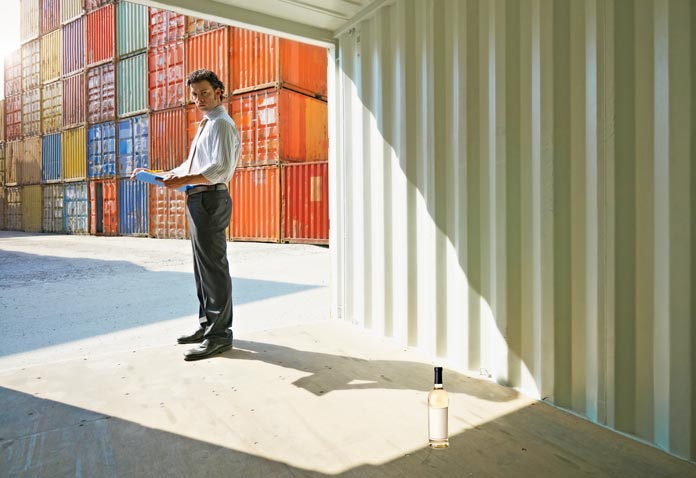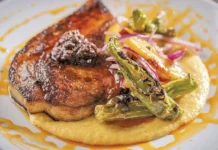
What do a Clevis, peat, and a bunch of grapes have in common? They’re unlikely bedfellows in a series of retaliatory tariffs that are currently strangling the wine and spirits and hospitality industries in America.
Christine LoCascio, Distilled Spirits Council of the United States Chief, Public Policy explains, “The spirits industry has benefitted from duty free trade from 1997 to 2018 when retaliatory tariffs were imposed. Over the past few years with trade disputes that have nothing to do with our industry, wine and spirits were caught in the middle.”
At the end of last year, the vise got tighter.
On December 30, 2020 USTR announced new 25 percent tariffs on certain Cognac, other grape brandies and non-sparkling wine from France and Germany. These tariffs apply to Cognac and other grape brandies valued at $38 per proof liter and above ($22.80 for a 750 ml bottle at 40% abv) and non-sparkling wines that are entered for consumption, or withdrawn from a warehouse for consumption, on or after 12:01 a.m. eastern standard time on Tuesday, January 12, 2021.
And this is on top of what preceded this announcement: On June 2018, The EU imposed a 25 percent retaliatory tariff on American Whiskey in response to U.S. Section 232 tariffs on steel and aluminum. Since the imposition of the tariff, American Whiskey exports to the EU, our largest export market, have plunged 41 percent, from $757 million to $448 million (July 2017-June 2018 compared to September 2019-October 2020). American Whiskey exports to the UK, our second largest market, have declined by 55 percent, from $172 million to $94 million (July 2017-June 2018 compared to September 2019-October 2020). October 2019 The U.S. imposed a 25 percent retaliatory tariff on Single Malt Scotch Whisky and Single Malt Irish Whiskey from Northern Ireland, and liqueurs and cordials from Germany, Ireland, Italy, Spain, and the UK in the WTO Airbus dispute.
U.S. imports of Scotch Whisky were down by nearly 39 percent between November 2019 and October 2020 ($956 million) compared to November 2018 through October 2019 ($1.58 billion). U.S. imports of liqueurs and cordials from Germany, Ireland, Italy, Spain, and the United Kingdom were down by approximately 40 percent between November 2019 and October 2020 ($353 million) compared to November 2018 through October 2019 ($591 million). U.S. imports of the categories of wines concerned by the tariffs from Germany, France, Spain, and the UK went down by 54 percent between November 2019 and October 2020 ($745 million) compared to November 2018 through October 2019 ($1.62 billion). December 8, 2020 The United Kingdom announced it will not maintain the tariff on U.S. rum, brandy, and vodka when it departs the EU Customs Union on January 1, 2021 but would maintain the tariff on American Whiskey as it evaluates its response to U.S. steel and aluminum tariffs. (source: Distilled Spirits Council of the United States)
LoCascio and her team have long been both warning about the drastic impact these tariffs have on the industry and lobbying against them.
These warnings couldn’t have been more accurate. American businesses, restaurants, bars, distillers, distributors, shippers, designers, and more are seeing the negative impact more every day. As a whole, the alcohol beverage sector contributes more than four million jobs to the US economy; and the ability to import and export freely provides access to adult consumers around the globe while supporting jobs in the US agriculture, manufacturing, hospitality, and logistics sectors of our economy. On top of the havoc wreaked by the pandemic soon consumers will feel the pinch as well in myriad ways.
 The hit couldn’t have come at a worse time. Though, it certainly could have come with some warning. Unfortunately, for importers, with the tariffs announced and then implemented almost immediately afterwards news of the newest round of tariffs came as product was already on the water. Cheryl Stanley, Lecturer – Food & Beverage, The Hotel School, Cornell SC Johnson College of Business, shares, “I remember talking to wine importers and asking them ‘what are you going to do?’ They couldn’t plan ahead to bring that extra container in. I’m sure many distributors have run out of their pre-tariff inventory, so they do not have the luxury of the slow increase and their prices will reflect the full tariff.”
The hit couldn’t have come at a worse time. Though, it certainly could have come with some warning. Unfortunately, for importers, with the tariffs announced and then implemented almost immediately afterwards news of the newest round of tariffs came as product was already on the water. Cheryl Stanley, Lecturer – Food & Beverage, The Hotel School, Cornell SC Johnson College of Business, shares, “I remember talking to wine importers and asking them ‘what are you going to do?’ They couldn’t plan ahead to bring that extra container in. I’m sure many distributors have run out of their pre-tariff inventory, so they do not have the luxury of the slow increase and their prices will reflect the full tariff.”
A price raise is challenging. For consumers, retailers, and hospitality industry buyers alike. Especially when you consider that fifty-four percent of the price of a bottle of distilled spirits is consumed by taxes and fees, so making any profit becomes more challenging without a noticeable price raise. And resulting fall out of consumer satisfaction and robust inventory.
Stanley continues with her thoughts about the challenges for retailers and notes, “The average U.S. consumer does not understand pricing and how the U.S. alcohol market is set-up. They just see the price and see that it is more expensive. Especially with COVID-19, I could see some consumers thinking the store is charging more due to the pandemic and not understanding why the increase has come up. Now the retailer has to educate as well as sell.”
Similarly, restaurateurs rebuilding wine lists when they reopen will find themselves even more impacted by the bottom line. And, eventually, without much choice. Sommelier Erik Segelbaum, founder of wine consultancy SOMMLYAY, comments, “When the US is no longer a reliable trading partner, producers turn to other countries who are champing at the bit. These countries are Brazil and China. Two of US’s biggest adversaries on the trade front. We are losing these wines. Our biggest trade competitors are going to get all of this wine. Or trade partners like Scandinavians are getting new allocations. And what happens is Americans don’t get these wines back. There are decades of relationships gone.”
He continues, “So every major wine producing region in America realizes these tariffs are bad for American wines too. It cripples their path to market.”
Leaving restaurants and bars with limited wine and spirits lists that don’t always enhance the dining experience and add burden to operations. Losing entire categories, like cognac, which are singularly tied to an appellation, leaves restaurants and bars juggling the heavy burden of making the list work fiscally while working at least twice as hard. Stanley comments, “There are brandies from other countries, and you can put them on the list. You can educate. But that’s a heavy lift – educating the staff, printing of the menus, educating the guests.”
So, what’s the solution to all this increased pricing, and potentially limited selection as we move through this phase of the pandemic and on into the next? Lots of education. More lobbying. And hope. As Swonger concludes, “We have a new administration with a new approach to trade.”























